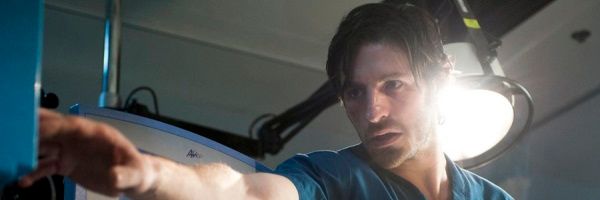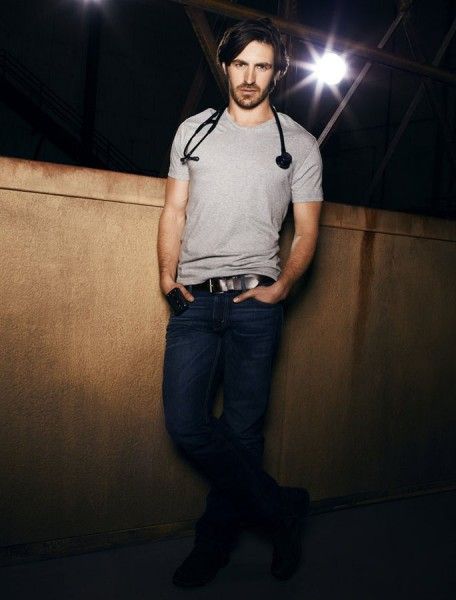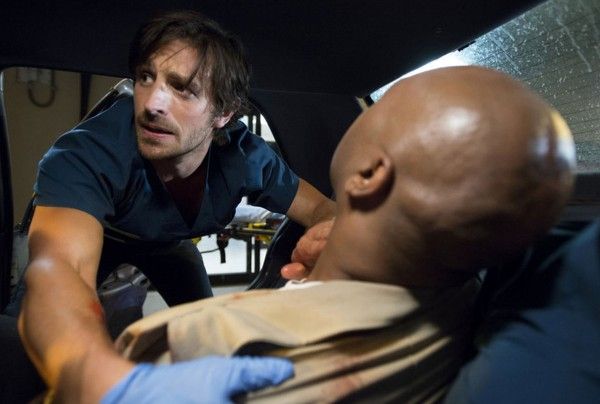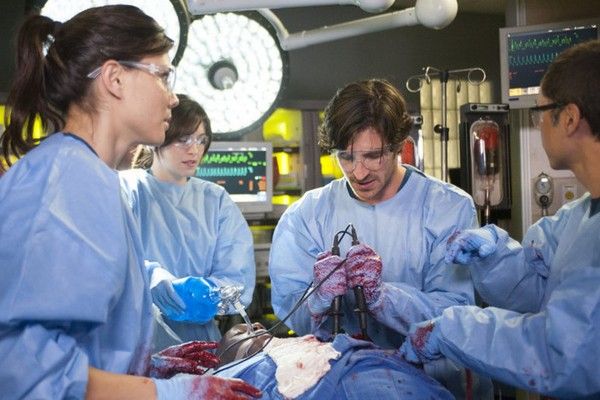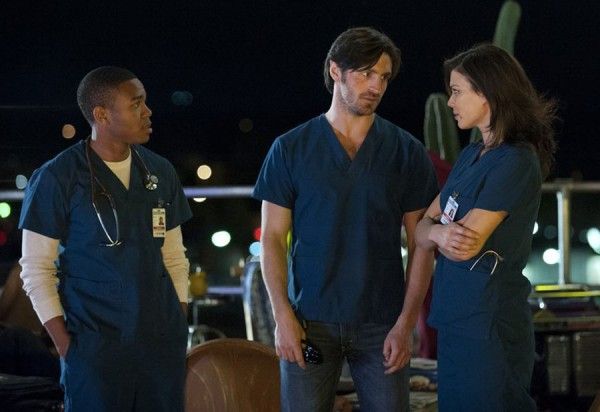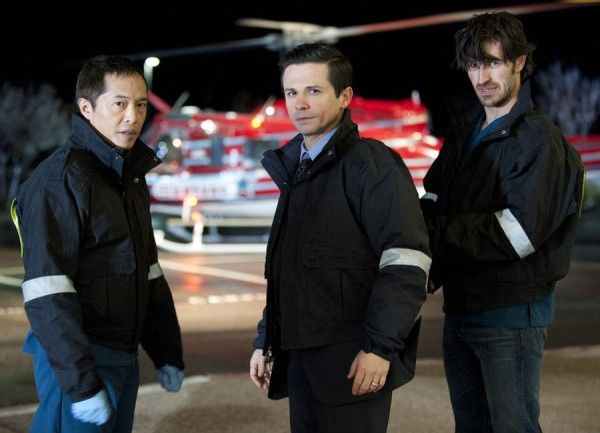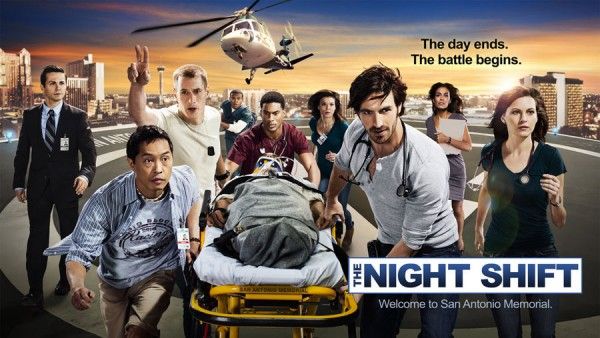The toughest and craziest cases always seem to come through the door on the night shift, which is certainly true for San Antonio Hospital on the new NBC drama series The Night Shift. Saving lives is a huge challenge in an underfunded hospital, so the team of adrenaline junkies who do just that, on a nightly basis, push the rules as far and as creatively as they can. From show creators Gabe Sachs and Jeff Judah, the show stars Eoin Macken, Freddy Rodriguez, Jill Flint, Ken Leung, Brendan Fehr, Robert Bailey Jr., Jeananne Goossen, Daniella Alonso and JR Lemon.
During this exclusive phone interview with Collider, actor Eoin Macken (who plays TC Callahan, an Army doctor who has recently returned from Afghanistan, and is equal parts brilliant and cocky) talked about how he came to be a part of the show, recording his audition on tape during a break from directing his own movie, why this show and character appealed to him, the research he did for the role, understanding grief, and how much fun he had working with this cast. He also talked about the memorable experience of his time on Merlin, and what led him to directing. Check out what he had to say after the jump, and be aware that there are some spoilers.
Collider: How did you come to this show?
EOIN MACKEN: I’d never properly done pilot season in America. I did it for just a couple of weeks, a couple of years ago. Usually, you get pilot scripts and the initial script quality isn’t there. But I got sent this script last season, and I thought it was brilliant. So, I first did a tape, and they really liked it. They asked me to come to L.A. to audition, but I was directing my own movie, at the time, and was literally right in the middle of doing it. So, I shot my audition, at the end of a day of shooting. We were shooting on top of this cliff, back where I live, and at the end of the day, I just handed Tom Hopper, who was in Black Sails and is in the film with me, the sides and told everyone that I was going to buy them loads of wine and we were going to go drinking, once they gave me 20 minutes to shoot this audition tape. So, I had all of the sound crew and the lighting and the RED camera and my D.P. I was like, “Okay, this is what we’re gonna do, you’re gonna shoot and I’m gonna sit here and do these lines, real quick.” I made it look really pretty, and that was it.
Do you typically like auditioning on tape or do you find that challenging?
MACKEN: I love auditioning on tape because you have the time and the freedom to work on it, a little bit. A lot of film is slightly dependent on what your composition is and what your lighting is. If you go into a room, and it’s just a white room, it can be a bit sterile. Doing a tape can be helpful in certain situations. I shot this one on a cliff and it was kind of windy, and you could see the cliff and the winds behind me, and I think it gave it an energy it wouldn’t have had, if I’d been sitting in a chair.
This show couldn’t possibly be more different from Merlin. Was that intentional? If you were going to sign on for another TV series, did you want to make sure it was something very unlike the last one?
MACKEN: I wish I could tell you that it’s a conscious choice to do exactly what you want to do next, but I did have it in my head that I wanted to do something that involved jeans and a t-shirt. Merlin was awesome, but the costumes would drive you insane. Every day, you’d get into chain mail and wear 30 pounds of that stuff. You’re having a great time, but it becomes a drag after several months. So, I was trying to do something a bit more contemporary. And then, this came about and I got lucky. And they let me wear jeans and a t-shirt, so I was like, “This is fuckin’ awesome!” I got along really well with the costume designer, when we did the pilot. He became a really good friend of mine. He was like, “Do you want to wear jeans and a t-shirt?” I was like, “Yes, please!” It was amazing. The key to wearing a comfortable costume on set is to go drinking with the costume designer before you start shooting.
What was it about this show and this character that you found yourself identifying with?
MACKEN: What I liked about TC, and what I think you search for when you’re doing a character, is to have something going on below the surface, all the time. When you’re in college, you meet somebody that you think is a little bit arrogant and cocky, and you don’t like them because they have this attitude about them that seems grating, and then you realize that they have their issues and this whole other side going on. And what I liked about TC was that he seemed like a really cool character that would be fun to play, but he was also quite broken. I liked the fact that he was trying to hide that, all the way through, and that he was struggling with something. He’s got this great, fun, maverick quality to him, where he gets to play around with stuff, but he’s also really broken inside and all these situations happen that he struggles to contain. I just thought that was great. And I thought the whole burgeoning relationship with him and Jordan, which has been stifled, was fascinating. I just thought he was a great character.
Is this a character that you had to worry, at all, about making him likeable?
MACKEN: No, actually. What’s great is that television is very dependent on the writers. With Gabe [Sachs] and Jeff [Judah], the writing was great. They define the characters really well, so all you have to do is bring a bit of personality to it. With TC, they just said to bring a bit of charm to it. They create these great situations, so it’s just about playing around with what they’ve written for this guy. So, I never thought about trying to make him likeable. It was more about making him believable. He’s actually a bit of a dick, but he’s that kind of lovable rogue. Even though he might drive you a bit crazy and you think he’s an arrogant guy that you don’t like, when you get to know him, you realize that he’s hiding a lot and that he means well. A lot of my family are in the medical profession. Two of my aunts are doctors and my mom is a nurse. It’s a really difficult thing to be in a hospital environment and make these decisions about people’s welfare. They’re life-and-death decisions. That’s gotta take its toll on you. It’s so hard making those decisions, every single day. I couldn’t ever do that, in real life. It would just be crazy. I admire anybody who works in a hospital, and then when you add on working the night shift, there’s a lot of emotional and physical activity, every single night. It’s gotta be so hard. With TC, I was just trying to get across that sense of adrenaline and that sense of being on the edge, all the time. After doing that, day in and day out, that’s going to take a toll on you, mentally and physically.
Did you do any specific research for this?
MACKEN: Yeah, I read a lot of books. The minute I got the script, I ended up reading six or seven books, all to specifically do with PTSD, and also to do with training. There are a lot of war medic books, which I never realized before. There are an awful lot of accounts of that. And I sat in a hospital in Dublin with my aunt, for a night shift. I studied the psychology, as well, and I talked to a few people to get a compass of, when you put this altogether, how it would affect somebody. I was just hoping that, when I do it, it comes across and makes sense. You try to bring your own experiences from any trauma that’s happened to you in your own life, and you cross-pollinate that. You can only try to remember what certain things felt like, in your own life, and try to heighten that.
The cast photo with you riding a motorcycle through the emergency room seems crazy, but it also seems like a good representation of the level of chaos that you’d find in the ER on a night shift. Does the chaos remain at that level, throughout the series?
MACKEN: It’s funny you mention that because we did those cast photos, and I don’t know if I’ll get in trouble for saying this, but we were all so hung over. We had just finished shooting, the day before, and we decided to hang out together. The next day, we were dying, so that photo shoot was intense. No one really knew what was going on in our heads, and then they brought in this motorbike. I was just having fun. I got to sit on a motorbike while they had to stand. IT was great. But, it did seem like a very accurate representation [of the chaos], now that you bring it up. I never thought of it like that before. I’m never going to look at that photo the same, now that you’ve said that.
Do you think it’s bad for this guy to be working with so many people that he clearly has history with, or is that the thing that’s helping keep him together?
MACKEN: It’s both. TC is a character that doesn’t want any structure. He likes freedom and he likes being his own man, but he’s a very loyal person and he needs support around him, even if he doesn’t want to admit it. He ends up working at the same hospital as Jordan, and he wants to stay working with Topher and Drew. It’s very important for him to have people there that he cares about, and they are the people he cares about most, in life. When someone has spent their life being a medic on tour, in the middle of a war, and then they’re going through all this trauma, you’re gonna want to constantly relive that and feed off the energy of the chaos, all the time. He needs the emotional support of the people he cares about, and he knows that he can look after them. But, he needs them, almost more than they need him. I think it’s important that he has those people around, even if he fights it. There’s a beautiful level of support between all of the characters. Even when things go wrong, they’ve got each other’s backs. And they all respect each other, even when they make mistakes, because they all know that they’re fundamentally trying to do the right thing. Topher and Jordan are very forgiving of TC’s behavior because they know he’s suffering, but they also respect him for what he does. They look out for each other.
Do you think that TC and Jordan would still be together, if he could just figure out how to communicate to her?
MACKEN: I just think communication between men and women is always difficult. Being in the same working environment as someone you’re in love with or dating has gotta be pretty intense. That’s gonna make it even more difficult, especially if you’re in an intense environment, like the night shift. If you’re TC, you just pull back from it all and don’t deal with it. He does his own thing and just lets all of the other stuff float around him without addressing it.
Do you think that TC can deal with the intense trauma he’s experienced on his own, or does he really need the help from all of these people in his life?
MACKEN: I had my own experience with grief when my dad died seven years ago. He had a brain tumor. I realized that grief doesn’t follow this simple pattern that you read in a book, where you go through stages. It goes back and forth and swings. It comes and goes in waves. So, I think that with TC, he’s never fully dealt with the grief from his brother. I can’t imagine what it’s like to be in a war situation and actually see people you care about die in front of you. My dad died when I was in the room, and I was the only person there, at the time that he died. I remember what that felt like. I didn’t deal with that myself for probably a year or two, until after it occurred to me that I was doing one thing because of the other. I think TC is basically running away from fully facing up to the traumas of what he experienced. That starts to overwhelm him in waves, and he doesn’t know how to cope with it. With grief, it doesn’t matter if you’ve studied it. I have a degree in psychology, but that doesn’t matter. Even if you understand exactly what’s going to happen, you can’t stop what happens. Two and two doesn’t make four anymore because it’s overridden by emotion. I think TC rails and fights against the idea of suffering and having to deal with the trauma, but eventually it will just wash over him, like a tidal wave.
There’s a great bromance with TC and Topher. Was it fun to get to play that dynamic, with Ken Leung?
MACKEN: They did a great job in casting. When we turned up, we were like, “We’re meant to be best friends?” I had never met Ken before, but he’s just awesome. That’s who Ken is. He has this really calming personality. The first day I saw him was at the read-through in Albuquerque, and he was wearing flip-flops and shorts. He said, “Let’s go outside,” and he started telling me some zen stuff about where he was in his life, as a person. I had just met him and I was like, “Yeah, this makes total sense.” We just got on really well. I have a lot of fun playing with Ken, and joking around with him.
There’s also a very different relationship with TC and Ragosa (Freddy Rodriguez), where you have to go a couple rounds with each other before you get on the same page.
MACKEN: Yeah, Freddy is awesome. Everyone has different ways of working, and I like playing with people ‘cause it’s fun. What’s great about doing the stuff with Freddy is that he’s very focused and he knows exactly what he’s doing, in each scene, and I like to explore a little bit. We had a lot of fun, just playing with each other like that. He’d be trying to rile me up, and I’d rile him up because it’s fun.
Your character goes through some extreme emotional ups and downs. Was that exhausting, or is that just really satisfying, as an actor?
MACKEN: It’s both. I find that acting can be really exhausting, if you’re doing it properly. But, it’s incredibly exhilarating and liberating when you’re allowed to do that. I was lucky with TC because he’s got such a spectrum and he goes to some dark places that it was fun to explore that, but it is really tiring. I did go home and have a couple of drinks. I was like, “I need a whiskey after that.” It can get a little taxing. But when you’re playing a character like TC, I personally liked it when it became difficult and tiring. When it’s all very difficult internally, it makes it worthwhile. If I find it difficult, than the character will find it more difficult, and hopefully that comes across.
Do you enjoy the process of working on television, where you have different directors, each coming in with their own vision?
MACKEN: It’s interesting, I had never actually experienced that before. At first, I found it a bit confusing, but then I began to really enjoy it. Once you know your character, each director had a little bit of extra spice to give you. Everyone looks at something just slightly differently, and they would make you see it just slightly differently. It was a bit of a challenge, and it was fun to work around that. You just have to be really strong about what your character is, which makes you really certain in defining it.
Aside from probably having a permanent invitation to any comic book, sci-fi or fantasy convention that you ever want to make an appearance at, what does your experience on Merlin mean to you? Are there things you’ll always remember most fondly about it?
MACKEN: I’ve been really lucky, in that it was such a nice group of people on The Night Shift, in the cast and crew. But Merlin was the first time I had worked on a show that I went back to, for a two or three year period, and it was just the nicest group of people. I’m still best friends with five or six of the cast members, and a lot of the crew. I still talk to them, all the time. It was fun because you went to work and you were just on set with people that you really liked. We enjoyed what we were doing because we were making this fun fantasy about dragons and guys on horses. When you’re a kid, the idea of riding a horse and having a sword and dealing with dragons on a TV show, you always imagine it as being a fun journey, and that’s what it was. We got to go to France and film in the sunshine. We were doing sword-fighting outside of a castle. It was awesome. You have to take a step back and go, “Really? I’m in France and I’m doing stunt training with this guy who did Gladiator? What’s going on? This is cool.”
You said that you were directing when The Night Shift audition came up. Had you always wanted to step behind the camera?
MACKEN: I always wanted to write. I went into college with the idea of being a zoologist because I wanted to go to Africa and study big cats and write about them. And then, when I was in college, I started acting and I started to experience photography, and I began to love all of it. So, I wanted to be an actor, but when my dad was sick, I had to take a step back for a year and a half, and I went and studied cinematography. I fell in love with the process of making films and taking pictures, and the whole idea of it. I just didn’t think it was possible to do it. I didn’t think it was possible to go and make stories through filmmaking. When I started doing it, it was at the start of the digital age, and it was just at the time when they were bringing out Final Cut. All of a sudden, there were all these new possibilities to learn, very quickly, how to make things with, and it just seemed like a lot of fun. I wanted to do all of it.
The Night Shift airs on Tuesday nights on NBC.

